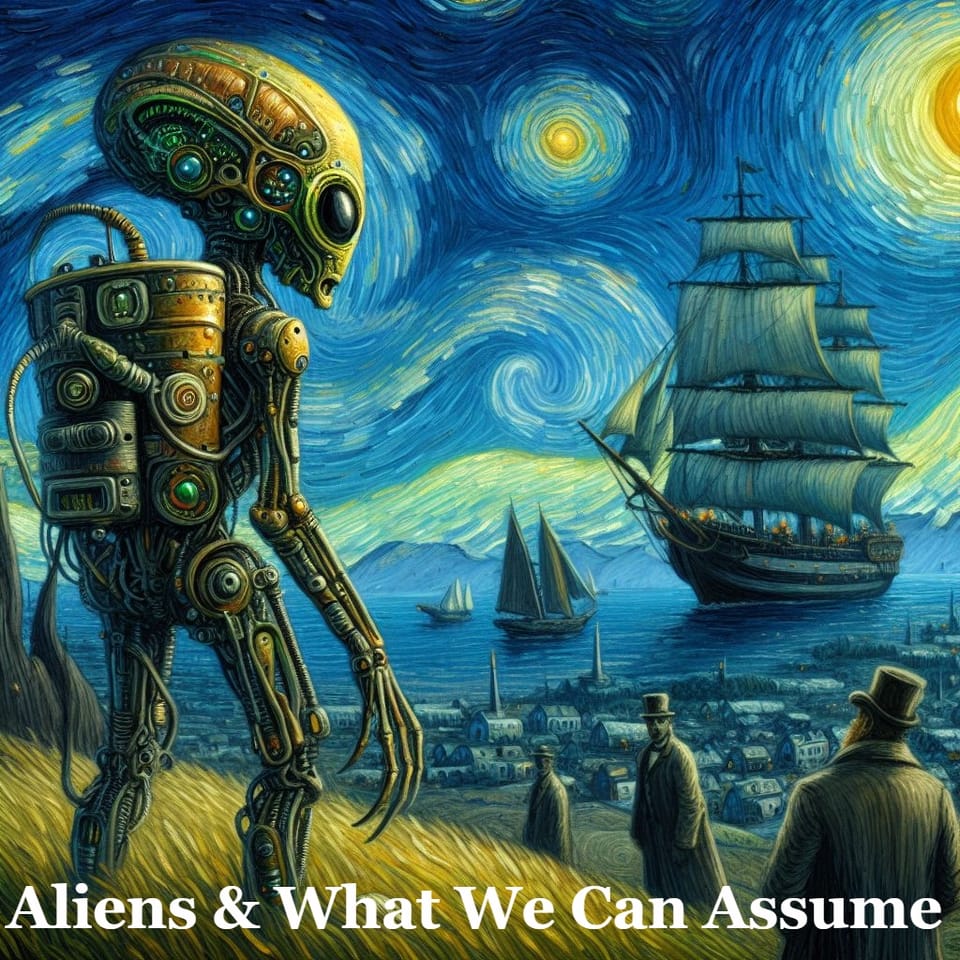Aliens & What We Can Assume

In the last century, western thought has evolved more towards a total rejection of an anthropocentric view of the universe; and while that is ultimately a good starting point for logical inquiry due to less ideological burdens, it has been distorted into an irrational approach. It has become fashionable to assume ignorance and to even reject known assumptions; and this is all the more evident in discussions about potential alien species from distant stars/galaxies.
Let us examine what we know of a visiting or invading alien species.
At this point in the discussion, many would already claim that "we cannot make any assumptions about an alien species", but this is not true. If we have some information, then we can surely make some assumptions; and we do know something if aliens visit us.
An Alien Economic System
We would know that they have the means to innovate, work together, and that they are comparatively equal to or better (as in, faster) at advancing than we are. It follows that they are (i) social, (ii) innovative, and that they could not be so without also being (iii) variable. That is, we would know that they could only have produced spaceships, computers, and long-term food sources for their long voyage via (i) working together and (ii) discovering new technologies and ideas. As for them being (iii) variable from one individual to another, some may claim that we can't rule out the possibility of a hive-like species where one individual is interchangeable with another a, but both innovation and complex production processes require a diversity of individuals. Someone has to have an idea that others do not, be it the invention of new technology or the idea that enables it to be produced [more efficiently]. Furthermore, tasks for the production of that good or service must be divided among those of whom are most competent but efficient enough to carry out those diverse tasks; and for those of whom have lower time preferences, they need to be paid in advance. On that last point, the entrepreneur assumes risk for the production of some good or service and pays others in advance of that good/service being produced; meaning he has different time preferences than those of whom get paid for their labor while that hospital is being built, despite the services of that hospital not existing yet to pay them for their labor. The entrepreneur only gets paid (if at all) when the endeavor is operational, but he must pay those with lower time preferences regardless. Thus, since complex production processes require a diversity of tasks and a diversity of time preferences, then complex production processes require a diversity of individuals.
On the matter of the hypothetical "hive-like" b yet advanced species, one is welcome to propose a means by which innovation and complex production processes can occur; yet as of now the only way in which a population of identical, interchangeable beings could advance is via (a) an evolutionary protocol ("instinct") much like the ant possesses, though this "advancement" is limited merely to the protocol itself. True advancement is the forming of entirely new protocol. Hence, new ideas must be discovered on an individual level and then communicated to the whole (yet another justification that a visiting alien species must be social). The only other way to advance for such a species is nothing short of (b) divine intervention for even the most minute of innovations.
In other words, for complex production processes to exist, beings need to have a diversity of skills and resources ("means"), a diversity of ends (someone must "see" a long-term end while others need only "see" the exchange for their efforts), and even a diversity of time preferences (when will my labor bear fruit?).
Interestingly, a visiting or invading alien species from another planet fits all of the criteria of the Austrian School of Economics' basic axioms. Such an alien species would obviously (I) behave purposefully, (II) be variable amongst individuals and have to respond to the reality of a variability in resources from one region to another, and (III) suffer from the disutility of labor. The disutility of labor will arise from any being that does not possess infinite energy, so technically, all creatures suffer from the fact that they will have to forego leisure in order to enjoy the fruits of labor. Labor cannot satisfy all ends for which it can be used as a means. We have to economize where and when to use the resource of labor.
As such, since higher principles of economics are deduced from these axioms, and a visiting alien species must fit the criteria of those axioms, then higher principles of economics applies to a visiting alien species! c
Would they have violent intervention?
If a society has violent intervention - that is, if it is not purely a free market - then the political dichotomy of that society is voluntarism/consent versus violence/force. The supply and demand principle shows us that exchanges are maximized in quantity when voluntarism is assumed; so when violence is present in the market, prosperity or the quantity of exchanges decreases. Thus, violent intervention (the state) necessarily has a net adverse affect on the market.
Even a holistic approach can show this if we simply observe the differences in efficiency and customer reviews of organizations founded and maintained voluntarily versus organizations founded and maintained on violence (government agencies, licensing, etc). It is likely that an alien species, being bound by the same economic principles that we ourselves are bound by, will know that the state has a parasitic nature to the markets and production. A society can and will advance under the shadow of the state, but it will do so in spite of the state not because of it.
As such, we cannot rule out the possibility of an alien species being statists any more than we can rule out the possibility of an alien species being voluntarists; but if they advance more quickly than we have, it is likely they would be less statist than we currently are.
For the psychology of a visiting alien species, I may be willing to alter the critic's claim to "we cannot make any assumptions about the personality or psychology of the visiting alien species". As for the component of psychology we have control over, ethics/morality, we may be able to at least establish a dichotomy a visiting alien species would have to obey.
Aliens & What We Can Assume II
An Alien Ethical System
coming soon
a I have to point out that, despite an ostensible cry for diversity, the socialist would have to discover an economic reality in which individuals are interchangeable as Rothbard has noted. That is, the socialist would have to justify his state programs with an economic theory that relies on an axiom of interchangeable, non-individuals rather than the axiomatic claim that people are diverse in their means, ends, and time preferences for their ends. Quite interestingly, what the socialist would have to do is discover what the economy of a hive-like species would be like, if such a species could have a complex economy.
b It should also be noted that "hive-like" is an inherently ambiguous term since individualism and collectivism exist on a spectrum. What I truly mean when talking about this term is that the more hive-like a species is, the less innovative. Specifically, it would innovate at slower rates since it would lack the diversity of thought and action required for innovation, since innovation is a spontaneous and unpredictable affair. As such, if a more hive-like alien species existed somewhere, it would take it longer to develop the means to locate and then travel to us than it would for a less hive-like species. Most important of all however, is that a complete hive-like species could not innovate at all since it lacks the incentives autonomous individuals require to produce new ideas.
c The principle of marginal utility, supply and demand, comparisons of violence in the markets versus voluntarism in the markets, etc.

Member discussion